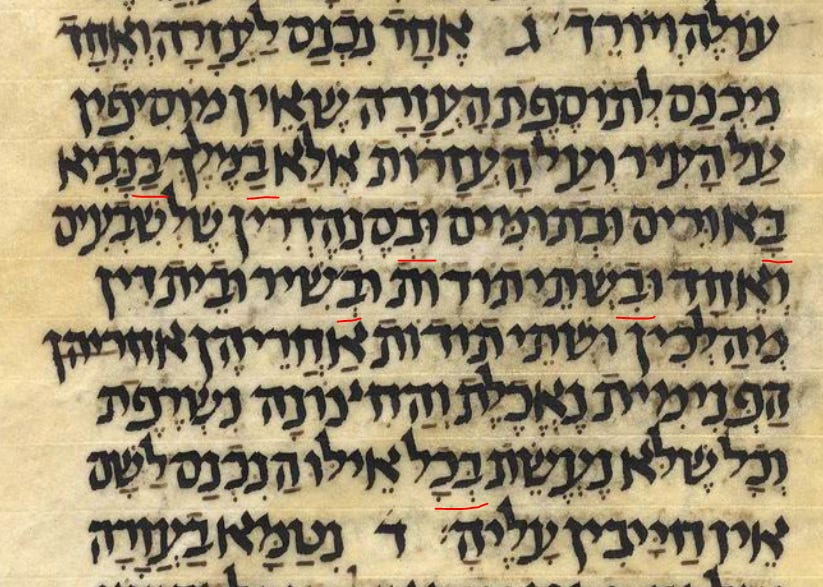Shevuot 14 and the Distributed Bet
The second perek of Shevuot begins, and part of the Mishnah details the requirements for extension:
אֶחָד הַנִּכְנָס לָעֲזָרָה וְאֶחָד הַנִּכְנָס לְתוֹסֶפֶת הָעֲזָרָה, שֶׁאֵין מוֹסִיפִין עַל הָעִיר וְעַל הָעֲזָרוֹת אֶלָּא בְּמֶלֶךְ וְנָבִיא וְאוּרִים וְתוּמִּים וְסַנְהֶדְרִין שֶׁל שִׁבְעִים וְאֶחָד, וּבִשְׁתֵּי תּוֹדוֹת וּבְשִׁיר.
As for the boundaries of the Temple with regard to the halakhot of impurity, the same halakha applies to one who enters the area that was part of the original Temple courtyard and to one who enters the later addition to the Temple courtyard, because the additional section is sanctified with the full sanctity of the Temple courtyard. The mishna notes: As, additions can be made to the city of Jerusalem or to the Temple courtyards only by a special body comprising the king, a prophet, the Urim VeTummim, and the Sanhedrin of seventy-one judges, and with two thanks-offerings and with a special song. Once the addition to the courtyard is made by this body and this process, it is given the full sanctity of the original courtyard area.
The enumeration begins with ela be- and then lists melech, navi, and so on. The bet thus distributes across each item in the list. The Mishnah later says:
וְכׇל שֶׁלֹּא נַעֲשֵׂית בְּכׇל אֵלּוּ – הַנִּכְנָס לְשָׁם אֵין חַיָּיב עָלֶיהָ.
And with regard to any addition to the Temple that was not made with all these ceremonial procedures, one who enters there while ritually impure is not liable to bring an offering if his entry was unwitting, nor to be punished with karet, excision from the World-to-Come, if his entry was intentional.
which is more about the Beit Hamikdash than the city. But still, a straightforward read might be that all these are required, and if any is absent, the extension would not be effective.
That single distributive bet is what appears in three printed Talmudic texts (Vilna, Venice, Pesaro). However, the manuscripts have a bet throughout:
Thus, be-melech, be-navi, be-Urim vetumim, etcetera. This seems like extra words, for no purpose, but maybe we shouldn’t make anything of it. It might just be stylistic.
(Look carefully at Vatifan 156 that skips the bet for navi, thus making melech and navi a unit.)
The printed Mishnah has some more bets, but not all of them:
אֶחָד הַנִּכְנָס לָעֲזָרָה וְאֶחָד הַנִּכְנָס לְתוֹסֶפֶת הָעֲזָרָה, שֶׁאֵין מוֹסִיפִין עַל הָעִיר וְעַל הָעֲזָרוֹת אֶלָּא בְמֶלֶךְ וְנָבִיא וְאוּרִים וְתֻמִּים וּבְסַנְהֶדְרִין שֶׁל שִׁבְעִים וְאֶחָד וּבִשְׁתֵּי תוֹדוֹת וּבְשִׁיר. וּבֵית דִּין מְהַלְּכִין וּשְׁתֵּי תוֹדוֹת אַחֲרֵיהֶם, וְכָל יִשְׂרָאֵל אַחֲרֵיהֶם. הַפְּנִימִית נֶאֱכֶלֶת וְהַחִיצוֹנָה נִשְׂרָפֶת. וְכֹל שֶׁלֹּא נַעֲשָׂה בְכָל אֵלּוּ, הַנִּכְנָס לְשָׁם אֵין חַיָּבִין עָלֶיהָ:
This might make melech, navi and urim vetumim into one list. Meanwhile the Kaufmann manuscript has this:
This is bet on each individual term in the list, and the first items in the list even have a definite article — it is ba rather than be.
It turns out that an unpcoming daf, 16a,, it turns out that AND vs. OR is a big issue in this list. That sugya begins:
כֹּל שֶׁלֹּא נַעֲשֵׂית בְּכׇל אֵלּוּ כּוּ׳. אִיתְּמַר, רַב הוּנָא אָמַר: ״בְּכׇל אֵלּוּ״ תְּנַן, רַב נַחְמָן אָמַר: ״בְּאַחַת מִכׇּל אֵלּוּ״ תְּנַן.
§ The mishna teaches: And with regard to any addition to the Temple that was not made with all these ceremonial procedures, one who enters there while ritually impure is not liable. It was stated that amora’im disagreed about the text of the mishna. Rav Huna says: We learned in the mishna: With all these, which means that all of these procedures are indispensable, and if even one is missing, the consecration does not take effect. Rav Naḥman says: We learned in the mishna: With one of all these; i.e., any one of these procedures suffices for the consecration to take effect.
Commentators seems divided whether this is an argument of the correct text of the Mishnah — does the word achat appear there or not — or how to interpret an agreed text of the Mishnah — namely does בְּכׇל אֵלּוּ really mean “in all” or does it mean “in any”?
I think the presence of absence of bet also feeds into it. Had the bet been omitted, like our printed texts, then I could see them being a complete set, where all are required. By introducing a bunch of extra syllables, ba, ba, ba, and thereby turning each item into a separate phrase, on a prosodic level, it seems like each has standing on its own. It makes the ambiguity more plausible. I think that I would therefore side with Rav Nachman.






